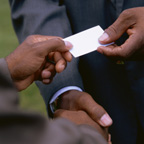Charities: Accept No Imitation

Most people support the work of legitimate charities.However, there’s nothing that puts someone in less of a giving mood than having an evening meal interrupted by a “courtesy” call or being hounded to give on your way into a store to shop. Aside from the annoyance of these spur-of-the-moment appeals, there’s also the lost opportunity of checking on the legitimacy of a charity, how much of your gift actually goes to the charity, and what the charity actually does. While dropping a dollar in a bucket here and there may not be worth the effort to research the destination of the gift, more substantial gifts may warrant spending a little time researching the gift’s destination.
How do I know the charity is legitimate?
The most obvious, but rarely utilized, way to find out if a charity is legitimate is to ask questions and to refrain from donating to the charity until these questions are answered to your satisfaction. Keep in mind a charity that needs your money today will welcome it just as much tomorrow. You don’t have to give on the spot just because they’ve knocked on your door, phoned your home, or handed out fliers in front of your workplace. Legitimate charities will welcome your interest in who they are and what they do. Be wary if the charity is reluctant to answer your questions. Ask the charity for their full name and address. Demand the solicitor show you some form of identification. In Illinois, the Attorney General’s Office keeps a local charity registration. By calling the Charitable Trust Bureau of the AG’s office, you can learn whether a charity is registered with the state or not. The benefit of registered organizations is that compliance means providing the Attorney General’s Office with information about their income, expenditures, programs, and administrators through a registration process. However, registration itself doesn’t imply the state or local government endorses the charity.
You can also check with the Better Business Bureau Wise Giving Alliance to see if there have been complaints about a charity. Additionally, you can request written information from the charity about their services and how they use the donations, but you should also be mindful that postal expenses exist and only request written information if you’re sincere in your desire to donate to the charity. A legitimate charity should be able to furnish you information outlining its mission, how your donation will be distributed, and proof that your contribution is tax deductible.
Pay attention to names. Some phony charities intentionally use names that look or sound like the names of legitimate charities. Once again, asking questions is your best defense against falling prey to such an organization. Write the name of the solicitor down, as well as a verbatim account of how they identified the organization. Then call the organization the solicitor is claiming to be affiliated with, ask if they’re currently conducting fundraising in your area in the method you were approached, and ask if the solicitor who contacted you is employed by the agency for such purpose.
Be wary of charities that offer to pick up your donation. Don’t donate cash. Donate using a check or money order made out to the charity by its full name. Don’t abbreviate the name of the charity, and don’t make the check out to the person soliciting the donation for the charity. These precautions serve two purposes: security and preparing you for tax time.
Do charities receive the same benefit from my donation?
No. Some charities hire paid fundraisers. Illinois law requires paid fundraisers to identify themselves as such and to name the charity for which they’re soliciting. These fundraisers usually take a percentage of the gift for their services. Frequently, this portion is substantial. Illinois law also requires professional fundraisers to disclose how much of your contribution will go to the charity if asked. So, ask.
Do they have the same levels of accountability that donated money will be used as intended?
All charities should have annual reports, financial statements, and a list of board members. These items should be provided readily upon request to an interested donor. These items should give you an idea of what kind of programs the charity operates; how, where, and when they do so; how the programs are carried out; who governs the charity; how much money the charity takes in; how much is spent on the programs and services themselves; how much is spent on fundraising; and administrative costs (employee salaries, utilities, rent for their facilities, etc.).
In evaluating a charity, compare its expenses to its income. Better Business Bureau standards require that at least half of the charity’s total income be spent on programs, at least 35 percent of contributions be spent on programs described in appeals (flyers, letters, advertisements, etc.), that no more than 35 percent of income be spent on fundraising, and that no more than half of the charity’s total income be spent on administrative and fundraising costs. Thus, it would be good to see if the Better Business Bureau has approved a charity. It would also be wise to ask what programs the charity operates locally, when they occur, and where they’re held.
The needs of legitimate charities are countless. Avoiding donation to non-legitimate charities and knowing how your money will be used and distributed by asking the proper questions of solicitors and representatives will help you not only feel more confident about your giving, but may help eliminate the existence of non-legitimate schemes and groups. IBI

